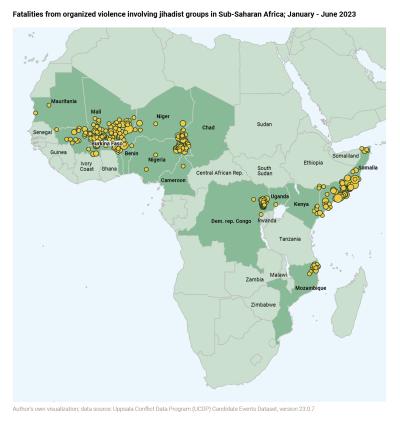Preventing jihadist expansion in Sub-Saharan Africa

During the first half of 2023, levels of jihadist violence increased substantially in sub-Saharan Africa, especially in Burkina Faso and Somalia, while remaining particularly high in eastern Congo (DRC), Mali, and Nigeria, which are
- In sub-Saharan Africa, jihadist violence was on the rise in the first half of 2023.
- Training local security forces is neither sufficient to counter jihadism nor does it guarantee the rule of law.
- Poor local governance enables jihadist groups to present themselves as alternatives to the state.
- States’ human rights violations foster grievances that increase jihadists’ ability to mobilize support.
only some of the most heavily affected countries across the continent. Jihadist groups also continue to seek access to new areas. Particularly concerning is the growing evidence of jihadist expansion from Burkina Faso into some of the Gulf of Guinea states, especially Benin and Togo.
Although sub-Saharan Africa comprises a diverse set of countries and regions, some overall trends emerge. Two crucial factors that enable jihadist groups to gain a foothold, across various country-specific contexts, are poor local governance and governments’ human rights violations against civilians. Statistical evidence shows that jihadist groups are significantly more likely to expand to countries where these conditions are given. At the same time, once they have managed to establish themselves in a new context, there is often a circular dynamic: Jihadist presence tends to undermine the ability of governments to provide effective governance, and governments also tend to violate human rights in their attempts to quell jihadist violence. When engaging with local governments in sub-Saharan Africa, the EU and its Member States should therefore place particular emphasis on measures that address these dynamics.
In recent years, the EU’s efforts to assist local governments in sub-Saharan Africa in curbing the spread of jihadism have strongly relied on the training and equipping of military-, police- and border forces, within the framework of the EU’s Common Security and Defence Policy. This engagement has been increasingly put in question after a series of military coups in Burkina Faso, Guinea, Mali and Niger. In several cases, leading figures involved in the coups had previously received EU-led military training or participated in military courses in EU Member States.
These developments point to a larger problem linked to an overly narrow approach to tackle the jihadist threat: Measures to capacitate security forces can fulfill an important function but are likely to remain insufficient if local governments fail to address the drivers of jihadist recruitment, among them poor local governance and human rights violations. Better trained and more well-equipped military forces may manage to detain and kill greater numbers of jihadists, but as long as local populations are exposed to a lack of basic public services and human rights violations, the jihadists will continue to attract new fighters.

Improve local governance
There is a robust pattern across different parts of sub-Saharan Africa of jihadist groups tending to be successful in socioeconomically marginalized areas that suffer from a lack of access to education, high unemployment and poor health services, as well as from a general climate of public insecurity and a lack of rule of law. Where the state fails to provide these essential services, it leaves a gap that other actors try to fill. Jihadists in conflict areas typically try to mobilize support by offering practical help such as monetary rewards, armed protection for communities in local conflicts or local dispute settlement.
Often, they seek to govern and provide parallel structures, especially in areas without deep-seated traditions for centralized governance. One of the seemingly most basic, but insufficiently addressed challenges therefore lies in the need for responsible governments to improve their service provision for local populations. For example, in northern Côte d’Ivoire, the increased provision of vocational training and access to credits for small businesses have been raised as successful measures to undermine the ability of jihadists to recruit followers through monetary rewards.
Extending the presence of police forces in at-risk communities and improving access to fair judicial trials are measures that can help to preempt jihadist attempts at presenting their enforcement of their version of sharia-law as a solution to local needs for law and order.
Avoid human rights violations
There is another pattern of jihadists gaining a foothold in countries whose governments systematically violate the human rights of civilians, for example through arbitrary or politically motivated arrests, enforced disappearances or the torturing of prisoners. In many cases, local fighters join jihadist groups to seek vengeance or protection from such violence carried out by state-affiliated actors. In turn, once jihadists become involved in local conflicts, it is exactly these forms of human rights violations that governments increasingly resort to, thus leading to a potentially vicious cycle.
The case of Burkina Faso works to illustrate this dynamic: Its government set up a paramilitary force to fight jihadists in late 2019. Soon after its creation, the paramilitaries started to be accused of anti-civilian violence, which was in turn exploited by the jihadists. Local officials sometimes claim that human rights concerns must take a backseat given the seriousness of the jihadist threat, but anti-civilian violence actually has a measurable, counterproductive effect as it enhances the jihadists’ ability to mobilize support.
To be able to target jihadists effectively and avoid indiscriminate repression, a crucial factor lies in the ability of governments to obtain intelligence. This may require investments into technical intelligence capacities, but it also requires collaboration from local communities. Here lies a major twist: Civilians are less willing to share intelligence with the state when they have been exposed to unlawful acts of repression and discrimination from governments or their security forces. Against this backdrop, when designing and implementing future training programs for police- and military forces in sub-Saharan Africa, the EU and its Member States should place even greater emphasis on imparting the knowledge that counterterrorism efforts risk undermining themselves when they resort to violence against civilians.
A difficult road ahead
In light of recent developments, the EU and its Member States need to rethink their engagement in sub-Saharan Africa. This includes the question of what future influence the EU will be able to retain in the wider region. A combination of growing anti-Western sentiments, often linked to discourses about colonial-era experiences (recently, and especially, in relation to France) and economic exploitation, disappointment over perceived double-standards in Western discourses, as well as growing influence from rivalling geopolitical actors like Russia and China, all potentially limit the EU’s leverage over local governments.
Even where the necessary political will to collaborate is given on both sides, money is often lost along the way due to pervasive corruption. Navigating these challenges is difficult and in some cases not feasible. At the same time, it is doubtful if a Western retreat will make things any better. In Mali, the replacement of Western troops by Wagner forces was followed by an escalation in state-attributed mass killings of civilians, which jihadist groups directly exploited in their propaganda.
Where it is still politically feasible, the EU and its Member States can play a potentially constructive role if they assist local governments through multidimensional approaches to counter and prevent jihadist violence. In doing so, their engagement should pay particular attention to the importance of measures that help improve local governance and reduce state-related human rights violations, as both indirectly risk playing into the hands of jihadists.
DIIS Experts





